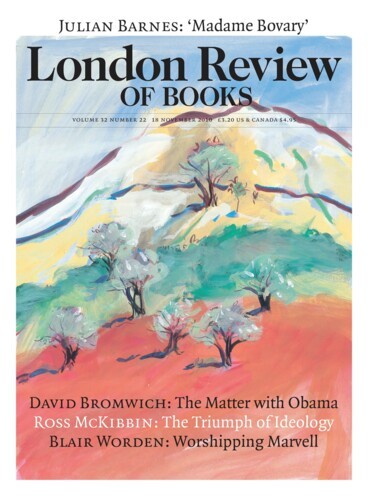Minutes before midnight last night, President Obama, in Paris, by a species of teleportable pen signed into law a four-year extension of the Patriot Act: the central domestic support of the security apparatus devised by the Bush administration, after the bombings of 11 September 2001 and the 'anthrax letters' a week later. The first Patriot Act passed the senate on 25 October 2001, by a vote of 98-1 – the opposing vote coming from Senator Russ Feingold of Wisconsin. In the years that followed, a minority view developed, which said that the Patriot Act 'went too far'; but its steadiest opponents have come from outside the mainstream media: the American Civil Liberties Union, the Cato Institute, and libertarian columnists such as Glenn Greenwald and Nat Hentoff.
David Bromwich
David Bromwich, Sterling Professor of English at Yale, is the author of many books, including Hazlitt: The Mind of a Critic, Moral Imagination: The Intellectual Life of Edmund Burke and How Words Make Things Happen.
President Obama’s theoretical willingness to continue the Bush tax cuts for the rich was first hinted at in a New York Times column by Peter Orszag on 6 September. Orszag had stepped down a few weeks earlier from his position as Obama’s director of the Office of Management and Budget, and he was known to be close to Obama; such a column, it was plain, would not have been written without the president’s encouragement. The novelty of the Orszag proposal was that Congress should extend the cuts for just two years.
The next day, a Times headline suggested that Obama would never stand for any kind of extension: ‘Obama is against a compromise on Bush tax cuts.’ But there was a complication. Obama wanted to let the lower rates expire for the top 2 per cent of earners, but stay in force for the remaining 98 per cent, whom he called ‘the middle class’. He was presenting himself as a statesman, uniquely concerned with the middle class, yet mindful of the budget deficit. The Republicans, Obama reasoned, by opposing him would show themselves both careless of the deficit and heartless toward the middle class.
The Fastidious President: The Matter with Obama
David Bromwich, 18 November 2010
The Afghan war looks as if it will outlast the Obama presidency, and if it does the largest single reason will be Obama’s choice of Robert Gates as secretary of defence. Gates worked under William Casey, the director of the CIA at the time of the Iran-Contra scandal. His nomination by Ronald Reagan to head the CIA was thwarted by suspicions of his complicity in covert operations in Nicaragua. The elder Bush later renominated him and got him through. Gates would have struck George H.W. Bush as a sound appointment because he knew the secrets and could be trusted to keep them. When the younger Bush, after the 2006 election, brought in Gates to replace Donald Rumsfeld at defence, he would have had in mind that history of loyalty to the Bush family. With Abu Ghraib and Bagram and Guantánamo to think of, Gates was a man to trust. Also, Gates might help to slow and muffle the incessant pressure from Cheney and his circle for an attack on Iran. It is generally supposed that Gates, together with Condoleezza Rice, held Cheney off and gave Bush the institutional backing to resist him.
Mistake
27 May 2010
Short Cuts: Edges of Darkness
David Bromwich, 27 May 2010
The release a few months ago of an American chase-thriller called Edge of Darkness brought to mind the 1985 Edge of Darkness: a BBC film originally shown in six parts, and one of the best political thrillers ever in any medium. Diversely admirable energies went into it: a script by Troy Kennedy Martin, music by Eric Clapton, direction by Martin Campbell (who also directed the Bourne-like...
Pieces about David Bromwich in the LRB
I prefer my mare: Hardy’s Bad Behaviour
Matthew Bevis, 10 October 2024
Not unlike the God he complains about, Thomas Hardy’s smilingness is often in league with his sadism, and writing poetry was a way for him to plead innocent and guilty at the same time.
No Theatricks: Burke
Ferdinand Mount, 21 August 2014
There were at least six great issues on which Burke defended the victims of mistreatment with a steely vigour and an unhesitating sympathy.
Bumming and Booing: William Wordsworth
John Mullan, 5 April 2001
David Lurie, the soured academic who is the protagonist of J.M. Coetzee’s novel Disgrace, earns his living as a professor of ‘communications’ in a Cape Town university (his...
The centre fights back
Lynn Hunt, 22 July 1993
Thanks to David Mamet’s new play Oleanna, the distracted, bumbling and self-regarding male professor has now become the archetypal victim of political correctness. Mamet’s John is...
Fiery Participles
D.A.N. Jones, 6 September 1984
Hazlitt is sometimes rather like Walt Whitman, democratic, containing multitudes, yet happy with solitary self-communion. In a pleasant essay called ‘A Sun-Bath – Nakedness’,...
Read anywhere with the London Review of Books app, available now from the App Store for Apple devices, Google Play for Android devices and Amazon for your Kindle Fire.
Sign up to our newsletter
For highlights from the latest issue, our archive and the blog, as well as news, events and exclusive promotions.



